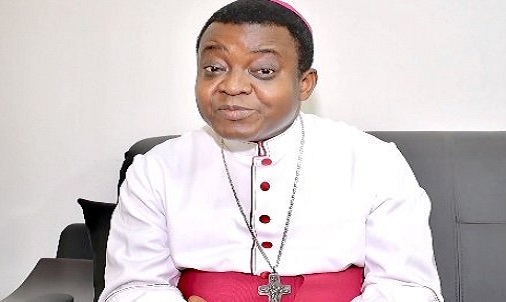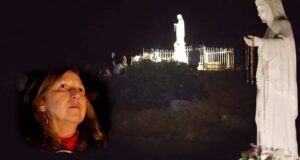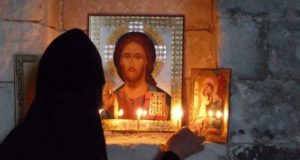📌 “في هذا النضال يجب أيضًا أن نرفع أعيننا إلى الرب لطلب مساعدته، وفقًا لتوجيه القديس أوغسطينوس: ‘افعل كل شيء كما لو كان يعتمد عليك، ولكن توقع كل شيء من الله “لأنه ليس بذكائه ومعرفته وحدهما سيتغلب الإنسان على الوباء. يجب أن نعتمد أيضًا على معونة الله. دوره في هذه المعركة لا يقدر بثمن.. “الطبيب يعتني بك ، ولكن الله هو الذي يشفي”.
📌 رجال دين فضلوا إغلاق أماكن العبادة عَ طلب بطاقة تطعيم من المؤمنين للمشاركة في العبادة”
📌 هل من المناسب حقًا استخدام الضغط والعقوبات لإجبار الناس على التطعيم؟
جين سميتس – اتهم التسلسل الهرمي للكنيسة في الدولة الواقعة في غرب إفريقيا الحكومة بالدوس على الحقوق الدينية للمواطنين وأدان تفويض اللقاح.
تواجه توغو قيودًا صارمة جديدة بشأن COVID-19 منذ تمديد حالة الطوارئ الصحية لمدة عام واحد في 9 سبتمبر بعد زيادة مزعومة في “حالات” SARS-CoV-2 مما أدى إلى ضغوط على المستشفيات.
نتيجة لذلك ، في 17 سبتمبر ، تم إغلاق أماكن العبادة والثقافة والترفيه وكذلك الحانات والمطاعم ، وتم حظر التجمعات العامة لمدة شهر واحد ، وتم إدخال تصريح صحي يتطلب إثبات جرعة واحدة على الأقل من لقاح COVID من أجل الوصول إلى جميع مباني الخدمة العامة.
الغالبية العظمى من سكان الدولة الصغيرة الواقعة في غرب إفريقيا البالغ عددهم 8.5 مليون نسمة لم يتلقوا اللقاح حتى الآن: تم توزيع مليون جرعة وتلقى 5 في المائة من إجمالي السكان التطعيم “الكامل” ، وفقًا لصحيفة فاينانشيال تايمز. وتقول السلطات المحلية إن 9 في المائة من البالغين تلقوا جرعتين ، وتلقى 13 في المائة جرعة واحدة.
تطلب الجامعات الحكومية أيضًا دليلًا على تلقيح واحد على الأقل لطلابها ، باستثناء أولئك الذين تقل أعمارهم عن 18 عامًا.
كان رد فعل مؤتمر الأساقفة الكاثوليك في توغو غاضبًا على إغلاق الكنائس ، متهمًا الحكومة التوغولية بالاعتداء على الحقوق الدينية للمواطنين. كما أدانوا بشدة تفويض اللقاح الذي يُفرض على السكان من خلال جعل الوصول إلى الخدمات العامة الأساسية مستحيلًا بدون الوخز. بعد اجتماع استثنائي في 24 سبتمبر / أيلول ، أصروا على أن التطعيم يجب أن يظل عملاً “تطوعيًا”.
عندما تم تمديد حالة الطوارئ ، أعلنت السلطات أنه سيتم إغلاق الخدمات الدينية في اليوم التالي ، في 10 سبتمبر. دخل المؤتمر الأسقفي الكاثوليكي في توغو (CET) على الفور في مناقشات مع الحكومة التي نجحت في تأجيل الإجراء لمدة أسبوع واحد. . وشدد الأساقفة على أن الكنائس الكاثوليكية في توغو “أماكن يتم فيها احترام الإجراءات الوقائية في الغالب مقارنة بالأماكن الأخرى التي لا تتأثر بنفس الإجراءات”.
قال أسقف دابونج للصحافة إنه على عكس مزاعم وزير في الحكومة ، لم يتم إغلاق الكنائس والمساجد لأن قادتها عارضوا التطعيم الإلزامي. وفقًا لـ “La Croix International” ، قال المطران دومينيك غويغبيلي إن الحكومة دعت السلطات الدينية بدلاً من ذلك إلى اجتماع حيث “قيل لهم إنه يجب إغلاق أماكن العبادة أو أن الوصول يجب أن يخضع لتقديم دليل على التطعيم . “
أوضح Guigbile أنهم رفضوا. وقال “حفاظا على حرية المواطنين في التطعيم ، قال رجال دين إنهم يفضلون إغلاق أماكن العبادة على طلب بطاقة تطعيم من المؤمنين للمشاركة في العبادة”.
جميع أساقفة توغو لا يعارضون لقاح COVID من حيث المبدأ. شجع رئيس الأساقفة نيكوديم باريجا بنيسان ، العاصمة لومي ، الكاثوليك على تلقي ضربة بالكوع. في أغسطس / آب في جنازة قس يبلغ من العمر 30 عامًا نُسبت وفاته إلى COVID ، قال: “بعاطفة كبيرة ، أحث الجميع ، بقدر ما لا تنطوي حالتهم الصحية على أي موانع ، على التطعيم للحماية أنفسهم والآخرين ، لأنها مسألة تتعلق بالصحة العامة “. وأضاف أن بعض ضحايا COVID “صغار جدًا”.
ومع ذلك ، أصر مؤتمر الأساقفة على أن الحصول على ضربة بالكوع يجب أن يكون نتيجة قرار “شخصي وحر ومسؤول” ، نقلاً عن التعليم المسيحي للمادة 1782 للكنيسة الكاثوليكية التي تنص على أن “للإنسان الحق في التصرف بضمير وحرية وذلك لاتخاذ قرارات أخلاقية بشكل شخصي “.
“إن موضوع التطعيم الدقيق ضد كوفيد -19 يستحق أيضًا التفكير العميق والنقاش. تنقل الشبكات الاجتماعية بالتأكيد الكثير من المعلومات الخاطئة حول هذا اللقاح. لكن لا يمكن للمرء ، بطريقة مسؤولة ، أن يتجاهل كل ما يقال عن الموثوقية والفعالية والخطر والآثار الجانبية ومشكلة الحفاظ على هذه اللقاحات ، والتي هي في الغالب في المرحلة التجريبية. ومن هنا تأتي الأسئلة ، وعدم الثقة ، والخوف ، والمتردد المفهوم من السكان في التطعيم.
في مثل هذا السياق ، هل من المناسب حقًا استخدام الضغط والعقوبات لإجبار الناس على التطعيم؟ ألا يجب علينا بالأحرى تطوير استراتيجيات تشرح وتقنع الناس لاتخاذ قرار شخصي وحر ومسؤول؟ وبالتالي ، ليست الإجراءات القسرية التي تتخذها السلطات ، مثل حظر الوصول إلى المباني العامة والإدارية دون بطاقة التطعيم ، واشتراط تقديم إثبات التطعيم لتقديم الملفات الخاصة بإنشاء بطاقة الهوية وللحصول على تقنين الوثائق ، وما إلى ذلك ، انتهاكات خطيرة للحقوق الأساسية للمواطنين؟ “
في الفقرات الافتتاحية من بيانهم المطول ، أوضح أساقفة توغو أنهم لا يتجاهلون الشكوك الشعبية بشأن أزمة فيروس كورونا:
“إن جائحة الفيروس التاجي الذي ظل يؤثر على العالم بأسره منذ ما يقرب من عامين هو بلا شك مشكلة صحية عامة معقدة للغاية وحساسة ، ليس فقط بسبب الفيروس ومخاطره المحتملة ، ولكن أيضًا بسبب عدم ثقة جزء كبير منه من السكان الذين يشتبهون في وجود أجندات “غير معلنة” و “خفية” و “مصالح مالية غامضة” و “ضغط من الأقوياء” والتي يجب أن نضيف إليها “قاعدة الفكر الفردي” و “القوة المطلقة لمن هم في السلطة” في هذا الحقل.
وأشار الأساقفة إلى أن توغو نسبت 216 حالة وفاة إلى COVID خلال عام ونصف ، وأضافوا أن الأمراض الأخرى لا تحظى بنفس الاهتمام:
“لو تم إظهار نفس الجهد الذي بذلته الحكومة لمكافحة هذا المرض فيما يتعلق بأمراض أخرى ، لكنا قد تجنبنا الكثير من المواقف التي نأسف لها اليوم: نقص أو عدم كفاية الهياكل الصحية المناسبة ، والمعدات المناسبة ، والموظفين ، والرعاية الجيدة ، ووسائل التشاور ودفع تكاليف الرعاية ، وما إلى ذلك “
من المؤكد أن أساقفة توغو ليسوا “متشككين من فيروس كورونا” ، وهم يوافقون رسميًا على جميع أنواع تدابير تقييد الحرية ، كما يظهر في بيانهم – ولكن ليس بدون محاذير:
“يجب أن تحترم استراتيجية محاربة الأزمة الصحية التي نمر بها كرامة الإنسان وحريته وحقوقه الأساسية. يجب أن يعتمد بشكل أساسي على زيادة الوعي ، وتقديم معلومات دقيقة ، وتثقيف الناس لاحترام التدابير الوقائية (ارتداء الأقنعة ، وتطهير اليدين ، والتباعد الجسدي) ، وتعزيز المناعة الجماعية الطبيعية ، وإدارة الرعاية العلاجية ، والتطعيم الطوعي والمستنير ، والبحث العلمي ، وما إلى ذلك “
اضافوا:
“ومع ذلك ، في هذا النضال ، يجب أيضًا أن نرفع أعيننا إلى الرب لطلب مساعدته (راجع مز122.2) ، وفقًا لتوجيه القديس أوغسطينوس: ‘افعل كل شيء كما لو كان يعتمد عليك ، ولكن توقع كل شيء من الله “لأنه ليس بذكائه ومعرفته وحدهما سيتغلب الإنسان على هذا الوباء. يجب أن نعتمد أيضًا على معونة الله. دوره في هذه المعركة لا يقدر بثمن ولا يمكن الاستغناء عنه. في الواقع ، القول المأثور المشهور: “الطبيب يعتني بك ، ولكن الله هو الذي يشفي”.
كما شجبوا مرة أخرى إغلاق الكنائس:
ولذلك ، فإن الإغلاق المنهجي لأماكن العبادة المستخدمة كوسيلة لمحاربة انتقال الفيروس ، هو نهج طبي حيوي للوباء يتجاهل واقعه النفسي والأنثروبولوجي والاجتماعي والروحي. أماكن العبادة ، وخاصة أماكن الكنيسة الكاثوليكية ، هي أماكن تحظى فيها تدابير الوقاية في الغالب بالاحترام مقارنة بالأماكن الأخرى التي لا تتأثر بنفس الإجراءات. تجمعات الصلاة هي أيضًا مناسبات وأماكن وأوقات تساعد على زيادة الوعي وتثقيف المؤمنين بما يجب القيام به. هل روعيت مساهمة المراجع الدينية بشكل كافٍ في قرار إغلاق هذه الأماكن؟ كل المؤشرات تدل على أنه لم يكن كذلك. ألم تُستخدم أماكن العبادة (بيت الله) دائمًا كملاجئ في حالة الكوارث أو الأخطار من أي نوع؟ “
لم يتطرق أساقفة توغو إلى القضايا الأخلاقية المرتبطة بالعديد من لقاحات COVID-19. تستخدم AstraZeneca و Pfizer و Johnson & Johnson على نطاق واسع في البلاد. ومع ذلك ، فإن أحد اللقاحات الصينية الأربعة الحالية ، وهو لقاح Sinovac ، وهو لقاح “تقليدي” لم يتم اختباره على خطوط خلايا جنينية ملوثة بالإجهاض ، متوفر أيضًا في توغو ، ولكن لم يتم تأكيد ذلك من قبل CET.
حتى الآن ، سجلت توغو 25429 حالة تسمى “حالة” COVID-19 منذ بداية الوباء ، بمتوسط دوري يبلغ 231 إصابة يومية على مدار سبعة أيام في 22 أغسطس. انخفض عدد الإصابات بشكل كبير منذ ذلك الحين ، الوصول إلى متوسط 63 “حالة” مسجلة يوميًا خلال الأيام السبعة الماضية في 30 سبتمبر.
لم يتجاوز متوسط عدد الوفيات اثنين في اليوم على مدار سبعة أيام منذ أول ضحية لـ COVID في توغو في 29 أبريل 2020 ؛ بلغ العدد الإجمالي للوفيات 229 حالة في الأول من أكتوبر / تشرين الأول. السكان في توغو : 40 في المائة منهم دون 15 عاماً ومتوسط العمر أقل من 20 عاماً. ويبلغ متوسط العمر المتوقع حوالي 64 عاماً. يعتبر مرض كوفيد غير ضار في الغالب للأشخاص الذين تقل أعمارهم عن 50 عامًا ، وتحدث معظم وفيات COVID (أو الوفيات المنسوبة إلى COVID) في المرضى الذين يعانون من اعتلال مشترك خطير واحد على الأقل.
Togo bishops conference slams forced vaccination
Jeanne Smits, Paris correspondent – The Church’s hierarchy in the West African nation accused the government of trampling on citizens’ religious rights and condemned the vaccine mandate.
(LifeSiteNews) — Togo is facing stringent new COVID-19 restrictions since the sanitary state of emergency was extended for one year on September 9 after an alleged increase in SARS-CoV-2 “cases” putting a strain on hospitals.
As a result, on September 17, places of worship, culture and leisure as well as bars and restaurants were closed, public gatherings were banned for one month, and a sanitary pass was introduced that requires proof of at least one dose of the COVID vaccine in order to gain access to all public service buildings.
The overwhelming majority of the 8.5 million inhabitants of the small West African state have not received the vaccine to date: 1 million doses have been distributed and a scant 5 percent of the total population has received “complete” vaccination, according to the Financial Times. Local authorities say 9 percent of adults received two doses, and 13 percent received one dose.
Public universities also require proof of at least one vaccination of their students, with the exception of those who are under 18.
The Catholic Bishops’ Conference of Togo reacted angrily to church closures, accusing the Togolese government of trampling on citizens’ religious rights. They also firmly condemned the vaccine mandate that is being imposed on the population by making access to essential public services impossible without the jab. After an extraordinary meeting on September 24, they insisted that vaccination must remain a “voluntary” act.
When the state of emergency was prolonged, authorities announced that religious services would be shut down the next day, on September 10. The Catholic Episcopal Conference of Togo (CET) immediately entered into discussions with the government that succeeded in postponing the measure for one week. The bishops underscored that Catholic churches in Togo are “places where preventive measures are mostly respected compared to other places that are not affected by the same measures.”
The bishop of Dapaong told the press that contrary to claims on the part of a government minister, churches and mosques were not closed because their leaders opposed mandatory vaccination. According to “La Croix International,” Bishop Dominique Guigbile said that the government had instead invited the religious authorities to a meeting where “they were told that places of worship must be closed or that access must be made subject to the presentation of proof of vaccination.”
Guigbile explained that they refused. “Religious leaders, in order to preserve the freedom of citizens with regard to the vaccine, said that they would rather see places of worship closed than require a vaccination card from the faithful to participate in worship,” he said.
All of the bishops of Togo are not opposed to the COVID vaccine on principle. Archbishop Nicodème Barrigah-Bénissan of Lomé, the capital, has encouraged Catholics to get the jab. In August at the funeral of a 30-year-old priest whose death was attributed to COVID, he said, “With great emotion, I urge everyone, insofar as their state of health status does not present any contraindications, to be vaccinated to protect themselves and others, because it is a matter of public health.” He added that some of the victims of COVID are “very young.”
However, the bishops’ conference insisted that getting the jab must be the result of a “personal, free and responsible” decision, quoting the Catechism of the Catholic Church’s article 1782 that states: “Man has the right to act in conscience and in freedom so as personally to make moral decisions.”
In a public statement published last week, the CET put the case against the COVID vaccine mandate in clear prudent terms:
“The delicate subject of vaccination against covid-19 also deserves deep reflection and debate. Social networks certainly convey a lot of false information about this vaccine. But one cannot, in a responsible way, sweep aside everything that is said about the reliability, the effectiveness, the danger, the side effects and the problem of the conservation of these vaccines, which are mostly in the experimental phase. Hence the questions, the mistrust, the fear and the understandable reluctance of the population to be vaccinated.
“In such a context, is it really appropriate to use pressure and sanctions to force people to be vaccinated? Shouldn’t we rather develop strategies that explain and convince people to make a personal, free and responsible decision? Consequently, aren’t the coercive measures taken by the authorities, such as the ban on access to public and administrative buildings without the vaccination card, the requirement to present proof of vaccination for the submission of files for the establishment of an identity card and for the legalization of documents, etc., serious violations of the basic rights of citizens?”
In the opening paragraphs of their lengthy statement, the bishops of Togo made clear that they do not brush aside popular suspicion regarding the COVID crisis:
“The coronavirus pandemic that has been affecting the whole world for almost two years is undeniably a public health problem that is both very complex and delicate, not only because of the virus and its potential dangers, but also because of the mistrust of a large part of the population that suspects the existence of “unspoken,” “hidden agendas,” “obscure financial interests” and “lobbying of the powerful” to which we must add the “rule of single thought” and the “omnipotence of those in power” in this field.”
Noting that in 1 ½ years Togo has attributed 216 deaths to COVID, the bishops added that other diseases do not get the same attention:
“If the same effort deployed by the government to fight this disease had been shown with regard to other diseases, we would have avoided so many of the situations we deplore today: lack or insufficiency of adequate health structures, appropriate equipment, personnel, quality care, means to consult and pay for care, etc.”
Surely the bishops of Togo are not “COVID skeptics,” and they officially approve all kinds of freedom-restricting measures, as appears in their statement – but not without caveats:
“The strategy to fight the health crisis we are going through must be respectful of the dignity, freedom and fundamental rights of the human person. It must be essentially based on raising awareness, providing accurate information, educating people to respect preventive measures (wearing masks, disinfecting hands, physical distancing), reinforcing natural collective immunity, administering curative care, voluntary and informed vaccination, scientific research, etc.”
They added:
“However, in this struggle, we must also raise our eyes to the Lord to implore his help (cf. Ps 122.2), in accordance with the exhortation of St. Augustine of Hippo: ‘Do everything as if it depended on you, but expecting everything from God’ because it is not by his intelligence and know-how alone that man will overcome this pandemic. We must also count on the help of God. His part in this fight is invaluable and irreplaceable. Indeed, the popular adage is well known: ‘the doctor takes care of you, but it is God who heals.’”
They also once again deplored the closing of churches:
“Therefore, the systematic closure of places of worship used as one of the means to fight against the transmission of the virus, is an exclusively biomedical approach of the pandemic that ignores its psychological, anthropological, social and spiritual reality. Places of worship, especially those of the Catholic Church, are places where prevention measures are mostly respected compared to other places that are not affected by the same measures. Prayer gatherings are also occasions, places and times that are conducive to raising awareness and educating the faithful on what to do. Was the contribution of religious authorities sufficiently taken into account in the decision to close these places? All indications are that it was not. Haven’t places of worship (the house of God) always served as shelters in case of disasters or dangers of any kind?”
The bishops of Togo did not address the moral issues attached to many of the COVID-19 vaccines. AstraZeneca, Pfizer and Johnson & Johnson have been widely used in the country. However, one of the four existing Chinese vaccines, Sinovac, a “traditional” vaccine that was not tested on abortion-tainted fetal cell lines, is also available in Togo, but this was not underscored by the CET.
To date, Togo has registered 25,429 so-called “cases” of COVID-19 since the beginning of the pandemic, with a peak rolling average of 231 daily infections over seven days on August 22. The number of infections has diminished dramatically since then, reaching an average of 63 daily registered “cases” over the last seven days on September 30.
The average number of deaths has not exceeded two per day over seven days since the first COVID victim in Togo on April 29, 2020; the total number of deaths was 229 on October 1. The population in Togo is very young: 40 percent are under 15 and the average age is under 20. Life expectancy is about 64 years. COVID is mostly harmless for people under 50, and most COVID deaths (or deaths attributed to COVID) occur in patients with at least one serious comorbidity.
 Agoraleaks Agoraleaks
Agoraleaks Agoraleaks







